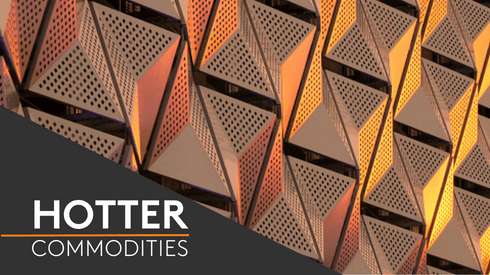On Tuesday March 15, duty-paid premiums in Rotterdam reached their highest level since Fastmarkets began assessing the market in 1987, despite there currently being no direct sanctions in place against Russian aluminium producers.
Fastmarkets assessed the aluminium P1020A premium, in-whs dp Rotterdam at $550-580 per tonne on Tuesday, rising from $540-575 per tonne the previous session and up by 33% since the beginning of the year.
Things were different in April 2018, when the United States sanctioned and froze assets of Russian oligarch Oleg Deripaska, who was then the majority owner of EN+ Group and key aluminium producer Rusal.
Those sanctions saw premiums rise across Europe and prompted several market participants to release official statements regarding their inability to purchase fresh Russian material, while at the same time being willing to trade “older” units that were already in the European Union.
But the most notable difference, pushing premiums higher this time around, is the pre-existing market tightness.
Aluminium supplies were already tightly constrained before Russia’s invasion of Ukraine on February 24, following several energy-related curtailment announcements in December 2021 and with market participants estimating that around 800,000 tonnes of aluminium production capacity was still offline during the first three months of 2022.
“Even before the Russia-Ukraine war, the aluminium market had been very tight due to low global inventories, strong physical demand, and a structural market deficit,” Fastmarkets’ analyst Andy Farida said.
LME warehouse stocks have been depleted over recent months and global inventory levels were most recently at 724,700 tonnes, compared with 1,286,300 tonnes at the beginning of April 2018.
On-warrant aluminium stock levels are less than half the total when sanctions were previously applied in early 2018. On-warrant stocks currently stand at 474,475 tonnes, compared with 1,008,725 tonnes available on-warrant in April 2018.
“The market in Europe is already tight, the developments between Russia and Ukraine are just the cherry on top,” one European trader said.
Fastmarkets analysts currently anticipate a 769,000-tonne global aluminium deficit for the second quarter of 2022, easing to a 112,000-tonne deficit in the third quarter.
“People are worried about taking Russian material at the moment and some companies are taking a hard stance – if we lose access to Russian material that is a big chunk of material out of the spot market,” a second trader in the region said.
Despite a lack of targeted sanctions on the Russian aluminium industry following invasion, several consumers have imposed their own restrictions by specifically requesting to handle only non-Russian origin material, participants said.
“For me, Russian is not an option,” a third trader said. “We are not allowed to take [Russian material] and our customers don’t want it either, so although its not sanctioned, it may as well be,” they added.
“Some [consumers] just won’t take [any Russian units]. For some it’s moral, for some it’s down to financing, and for some the risk is just too high,” a fourth trader said.
European aluminium premiums are being pushed up as a result, with the pool of available material substantially decreasing for those who are unwilling or unable to take Russian-origin material.
“For those who can’t touch Russian, if they come in with requests for good Western [material], they’ll have to pay up for it,” the fourth trader added.
Fastmarkets assessed the aluminium P1020A premium, in-whs dup Rotterdam at $410-440 per tonne on Wednesday March 16, up from $400-420 per tonne a week earlier and just $2 per tonne below the all-time high for the grade.
“The last time, the sanctions on Rusal were clear cut and there was a day on which all Russian [material] had to be warranted, so there was an immediate reaction. This time, it may filter through more slowly. A big difference this time is that there is an actual war and consumers will not want [to buy] a car made of Russian material,” a fifth trader said.
Market participants are cautious over potential future sanctions, with the US, European Union and United Kingdom governments continually updating restrictions as the war continues to develop.
“Maybe you don’t have sanctions today or tomorrow, but what happens if in three weeks’ time the [Western governments] decide to go even harder,” a sixth trader in the region told Fastmarkets.
A two-tier market is emerging for European premiums, sources said, with Russian-origin material being offered at a discount to non-Russian aluminium.
“There are lots of holders of old Russian metal in the market, and several consumers don’t want to buy it which means that people are rushing to offload [that material like a] hot potato,” a seventh European trader told Fastmarkets.
Deripaska was hit by a new set of sanctions imposed by the UK Government on Thursday, March 10. But the announcement had only a limited impact on aluminium premiums because Deripaska reduced his stake in Rusal to below 50% at the time of the 2018 sanctions, sources said.
“The sanctions on Deripaska are more of a political gesture rather than anything that will damage import flows between the UK and Russia,” the third trader said.
“I’m reassured by the British Government’s statement that it won’t touch the industry. This is a personal sanction to hurt Russia from within and, right now, it doesn’t seem like it should affect the UK working with Rusal,” the trader added.
Others are still trading Russian units, however, with some banks still able to provide finance for material of Russian origin.
The London Metal Exchange has also not imposed any specific restrictions on Russian material, either pre-existing units in global warehouses or new material entering the LME.
“[Russian-origin units] are not under sanctions, there are no legal limitations on trading the material and the market is too tight not to sell it into Europe at the premium levels,” an eighth trader told Fastmarkets.





